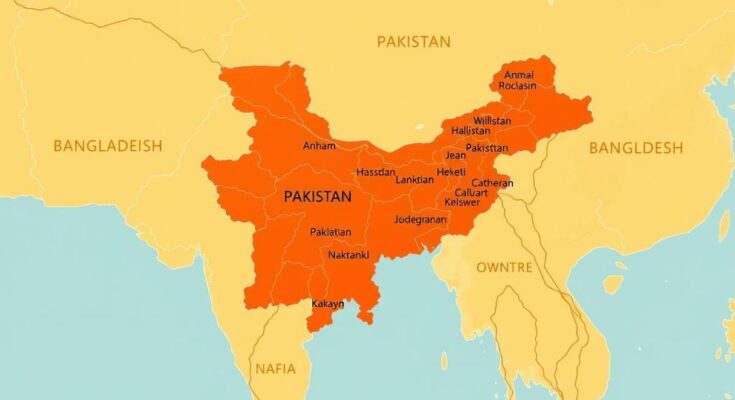Bangladesh has recently strengthened its ties with Pakistan, marked by direct trade and renewed military cooperation following Prime Minister Sheikh Hasina’s political struggles. The shift raises concerns for India, as historic animosities linger and economic ties remain limited. Despite efforts toward normalization, key issues from the 1971 war need resolution to truly mend relations between Dhaka and Islamabad.
Recent political shifts in Bangladesh have led to an unexpected thaw in relations with Pakistan, as Prime Minister Sheikh Hasina’s ousting altered diplomatic dynamics. For the first time, Bangladesh has engaged in direct trade with Pakistan, importing 50,000 tonnes of rice. Additionally, direct flights have resumed, military contacts have been enhanced, and visa processes have been simplified, leading to a potential collaboration on security initiatives.
The historical animosity stemming from the 1971 independence struggle between Bangladesh and Pakistan remains deeply embedded. Although relations initially improved between 2001 and 2006 under the Bangladesh Nationalist Party’s coalition government, they turned distant during Hasina’s tenure as she sought stronger ties with India. Following her recent political turmoil, however, the relationship shows signs of normalization.
According to Humayun Kabir, a former Bangladeshi diplomat, the trajectory of Bangladesh-Pakistan relations is improving, with both nations shifting towards a cordial neighborly connection. The renewed engagement has caught the attention of India, which historically maintains strained relations with Islamabad. Since Hasina’s political decline, India has been unresponsive to Bangladesh’s requests for her extradition on various charges, further straining Dhaka-New Delhi relations.
Experts suggest that this renewed bond between Bangladesh and Pakistan serves a broader strategic purpose. Ayesha Siddiqa, a Pakistani academic, posits that the two countries are collectively positioning themselves against India’s regional influence. Recent high-level meetings between Bangladeshi and Pakistani officials, along with increased military cooperation, reinforce this perspective.
Veena Sikri, former Indian high commissioner to Bangladesh, noted parallels with Pakistan’s past involvement with insurgents in Bangladesh. Currently, the porous border remains an area of concern, as it allows potential insurgent movements. The reinvigoration of military ties poses significant security implications for India, particularly against the backdrop of historical grievances.
The Yunus administration in Bangladesh has dismissed claims of Pakistani operational involvement within its borders, asserting that such accusations are unfounded. Nonetheless, some analysts caution that Bangladesh’s political leadership must balance its ties with Pakistan against the backdrop of its close economic and cultural ties with India. Diplomats emphasize that normalization with Pakistan requires addressing lingering historical issues, particularly regarding war crimes committed during the independence struggle.
Bangladesh’s calls for a formal apology from Pakistan for its wartime atrocities remain unresolved, a sticking point echoed by many voices including Ikram Sehgal, a former Pakistani military officer. Despite this historical context, there is a growing consensus among economists that Bangladesh and Pakistan should prioritize enhancing bilateral trade, which currently hovers below $700 million, predominantly favoring Pakistan.
As ongoing discussions regarding trade and political relations unfold, particularly with the anticipated visit of Pakistani Foreign Minister Ishaq Dar, the outcome of Bangladesh’s upcoming elections could also reshape future foreign policy orientations. For India, nurturing a stable and friendly Bangladesh is crucial for maintaining peace and stability in its northeastern region.
In conclusion, the thawing relations between Bangladesh and Pakistan, catalyzed by recent political shifts in Dhaka, signal a potential strategic alignment that warrants attention, particularly from India. The complexities of historical grievances, military cooperation, and economic ties underscore that while bilateral relations may improve, they remain fraught with challenges. Future political developments in Bangladesh, particularly post-elections, will be pivotal in shaping regional dynamics, influencing peace and stability in South Asia.
Original Source: www.bbc.com




